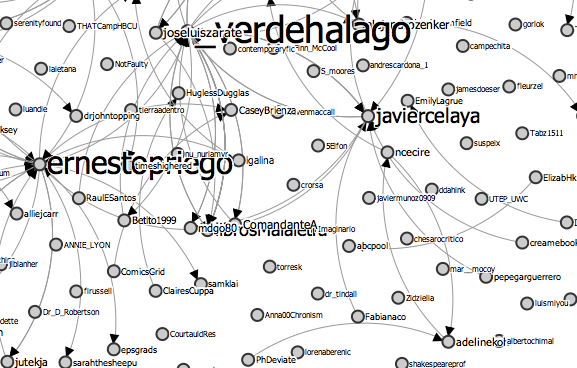
[Para la versión en español de este artículo, por favor hacer click aquí]
The “Second International Symposium The eBook in Spanish“, took place in Mexico City 11-14 September 2012. It was live streamed and the backchannel was active with the #libroelectronico or #libroelectrónico hashtags.
I followed the symposium online. On a positive note, the symposium was the cause of considerable spontaneous interest and engaged participation on Twitter; at least 1500 tweets were part of the event’s backchannel. Nevertheless, in general terms we can say the backchannel was very critical of the symposium itself.
A cursory glance on the backchannel shows many felt the presenters focused too much on the “sensuality” of the physical book (and the materiality and history of the book) and comparatively little on eBook-specific issues such as business models, metadata, etc.
Some participants in the stream even went ahead tweeting their own alternative symposium, offering numbered points on specific issues related to the eBook phenomenon, content they felt had been largely absent from the presentations.
Personally I felt this event was particularly important because it managed to inspire an engaged, passionate and informed discussion online, even if it was caused by the need to critique the lack of more focused discussion on specific eBook issues. To me the backchannel showed there is a specialised audience in Mexico who demands the discussion of advanced topics in digital publishing going beyond surpassed binaries that see digital publishing as what will “kill” the book trade.
Though I thought the discussion of the material qualities of the printed book and is history are important to understand recent, present and future developments in publishing technologies, I agreed with many on the backchannel that a symposium on the eBook phenomenon should not have focused so much on hypothetical futures or nostalgic visions of the past, but on challenging traditional technophobic prejudices and debating the current problematics book culture and publishing face in a digital age. It seems to me his is particularly pressing for a country where books are very expensive (to buy as a reader or to make as a publisher) and often very difficult if not sometimes simply impossible to get.
I created a Storify including all the tweets with that hashtag until the early morning of Friday 14th September.
That Storify archive is of course incomplete and I wanted to offer something more precise and quantitative as evidence, so I used Martin Hawksey’s TAGS V 3 to create a Google spreadsheet collecting all tweets tagged with #libroelectrónico. The spreadsheet automatically updates every 15 minutes. The spreadsheet archive is here.
You can see an interactive visualisation of this archive created with Martin Hawksey’s TAGSExplorer, offering a comparison with other Twitter hashtag archives such as #tweetyourthesis, here.

Having the archive on a spreadhseet (and visualised against the activity of other networks using other hashtags) is to me an excellent way of obtaining a fuller picture of a hashtag’s activity and the backchannel’s sentiment about an event.
Having it on a spreadsheet allows different visualisations and methods of analysing tweets in a way that the Twitter interface (or those of Twitter clients) could never do.
I think Martin Hawksey has created a very useful tool for Twitter network and backchannel (sentiment; WOM or word of mouth) analysis with TAGS and TAGSExplorer. Hopefully the recent changes to Twitter’s API won’t affect its excellent work.
Any event’s Twitter backchannel is unable to offer a total representation of a RL (“real life”) event. By definition it also includes the opinions of those not present. At the same time, often the backchannel is the backchannel precisely because it can offer a space for critique and dissent which often is muted from RL interactions. For better or worse, Twitter interaction is increasingly one of the main ways in which the impact of an event can be assessed in both quantitative and qualitative terms.
For the organisers having access to a complete archive of the tagged tweets offers a unique way of receiving the Twitter backchannel’s feedback about their event. Hopefully they will take it into account to inform their future activities.
3 thoughts on “#libroelectrónico: What Mexico’s eBook Symposium Backchannel Tells Us”